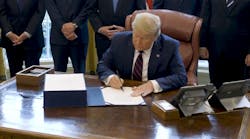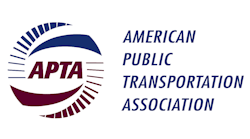Economic analysis puts pandemic impact on U.S. transit industry at $48.8 billion
The global COVID-19 pandemic now carries a much higher price tag for transit providers in the United States. The industry is expected to experience a $48.8-billion shortfall according to an economic analysis by EBP, US Inc.
Nearly 40 percent of annual transit budgets come from fares and other ridership-related revenue. The analysis found transit ridership is down 73 percent nationally in April 2020 as compared to April 2019 and fare revenues are down 86 percent nationally for the same time period. Other sources of transit revenue, such as state and local taxes and motor fuel tax revenues, are expected to see significant declines, as well. With all this considered, the analysis projects revenue losses at more than $26 billion in 2020 and more than $24 billion in 2021.
Capital spending and development could also experience negative impacts. The analysis estimates transit agencies nationally will likely need to decrease capital spending by $8.4 billion in 2020 and $7.8 billion in 2021. This reduction could also result in the loss of more than 30,000 construction jobs in both 2020 and 2021 due to project delays and cancellations.
The industry did receive $25 billion in emergency relief for operating expenses from the $2.2 trillion Coronavirus Aid, Relief and Economic Security (CARES) Act. However, the EPB analysis projects even with the CARES Act, the transit industry will face a funding gap of $23.8 billion between the second quarter 2020 and quarter four 2021.
To help bridge this gap, the American Public Transit Association (APTA) has asked Congress to provide an additional $23.8 billion in funding relief. The association’s proposal would see the emergency relief funding broken out as $19 billion through the Emergency Relief Program, which would be distributed proportionally to agencies with a demonstrated need and $4.75 billion provided through Urbanized Area Formula Grants, Seniors and Individuals with Disabilities Formula Grants and Rural Area Formula Grants. APTA has proposed both the emergency relief and formula funds be available for operating and capital expenses and at a 100 percent federal share.
“The $25 billion that was provided by the CARES Act was a lifesaver for public transit services, but we now have a more complete picture of the extraordinary and devastating impact,” said APTA President & CEO Paul P. Skoutelas. “These additional funds are critical to continue serving essential workers and make sure that we can help get our country back to work and to other activities that are so important for our economic recovery.”
APTA has sent a letter to leadership in both the House and Senate outlining its proposal. Additionally, the association provided the House Transportation & Infrastructure Committee with a virtual briefing on how the public transportation industry is coping with the COVID-19 pandemic and the additional aid that is needed.

Mischa Wanek-Libman | Group Editorial Director
Mischa Wanek-Libman is director of communications with Transdev North America. She has more than 20 years of experience working in the transportation industry covering construction projects, engineering challenges, transit and rail operations and best practices.
Wanek-Libman has held top editorial positions at freight rail and public transportation business-to-business publications including as editor-in-chief and editorial director of Mass Transit from 2018-2024. She has been recognized for editorial excellence through her individual work, as well as for collaborative content.
She is an active member of the American Public Transportation Association's Marketing and Communications Committee and served 14 years as a Board Observer on the National Railroad Construction and Maintenance Association (NRC) Board of Directors.
She is a graduate of Drake University in Des Moines, Iowa, where she earned a Bachelor of Arts degree in Journalism and Mass Communication.




